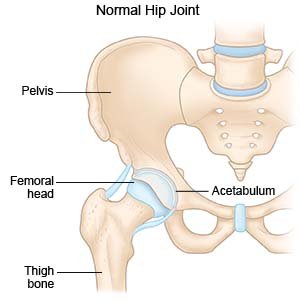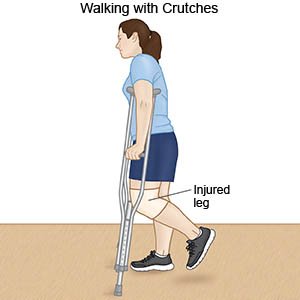Hip Impingement
Medically reviewed by Drugs.com. Last updated on Aug 4, 2025.
What is hip impingement?
Hip impingement happens when tissue becomes trapped between bones of your hip joint. This causes pain when you move the hip joint or sit for long periods. Over time, osteoarthritis can develop if cartilage in the joint is damaged or worn away.
 |
What causes or increases my risk for hip impingement?
The hip joint is made of a ball and socket. The ball normally moves easily in the socket during leg movement. Hip impingement is caused by extra bone growth on the ball, socket, or both. This causes the parts to grind together. Any of the following can lead to hip impingement:
- Shape problems with the hip's ball, socket, or both that you were born with
- Sports or activities that move the leg past a normal range of motion, such as dancing, baseball, football, or hockey
- A hip fracture or injury
- A hip condition such as slipped capital femoral epiphysis or Legg-Calve-Perthes disease
What are the signs and symptoms of hip impingement?
At first, you may have no signs or symptoms. Pain is the most common symptom. Pain usually happens in the groin but may also happen in the hip or lower back. Any of the following may develop over time:
- Problems moving your leg out past 90 degrees
- Stiffness in your hip, leg, or groin
- Limping when you walk
- A locking or catching feeling or a clicking sound when you move the joint area (tissue tear)
How is hip impingement diagnosed?
Tell your healthcare provider about any hip conditions or diseases you had as a child. Tell him or her if you ever had a hip injury or fracture. Your provider will ask you to put your hand on your hip where you feel pain. Tell him or her if you feel pain at rest or only during activity. Tell him or her if the pain is sharp or dull, and constant or comes and goes. Describe anything that makes the pain worse or better. Also describe any locking or catching feeling you have with motion, or clicking sound you hear.
- X-ray, CT, or MRI pictures may show areas of bone rubbing together. Pictures may also be taken of your lower spine to check for other problems that may be causing your pain.
- Leg motion will be examined. Your healthcare provider may have you lie on your back on a table. He or she will bend your knee and move it toward the opposite shoulder. He or she will then move the knee outward, away from your body. Pain with either motion can help confirm a diagnosis of hip impingement.
- Medicine may be injected into the joint to numb the area. Relief from pain can help confirm a diagnosis of hip impingement.
How is hip impingement treated?
Early treatment is important to help delay the development of osteoarthritis or other problems. Treatment may include any of the following:
- Rest may be needed first. Your healthcare provider may want you to rest your hip as much as possible. You may need to change certain activities that cause pain, such as sports.
- NSAIDs , such as ibuprofen, help decrease pain and inflammation. This medicine is available with or without a doctor's order. NSAIDs can cause stomach bleeding or kidney problems in certain people. If you take blood thinner medicine, always ask your healthcare provider if NSAIDs are safe for you. Always read the medicine label and follow directions.
- Physical therapy may be recommended. A physical therapist can teach you exercises to improve the strength and range of motion in your hip. Do not try to move your leg past the range of motion it has without help from a physical therapist. Too much motion can make hip impingement worse.
- Surgery may be needed if other treatments do not work. Arthroscopy is surgery done through small incisions. The shape of the ball or socket may be smoothed so they move together more easily. Cartilage may need to be moved or repaired. The labrum may need to be repaired. The labrum is tissue that cushions the hip and holds the ball in place within the socket. The joint space may also need to be cleaned out.
How can I manage my symptoms?
- Maintain a healthy weight. This helps decrease the strain on your hip joint. Ask your healthcare provider what a healthy weight is for you. He or she can help you create a weight loss plan if you are overweight.
- Apply heat or ice on the joint as directed. Heat and ice help decrease pain, swelling, and muscle spasms. For heat, use a heating pad on a low setting for 20 minutes, or take a warm bath. For ice, use an ice pack, or put crushed ice in a plastic bag. Cover it with a towel before you place it on your joint. Use ice for 15 minutes every hour.
- Massage the muscles around the joint. Massage helps relieve pain and stiffness. Your healthcare provider or a physical therapist can show you how to do this. Another person may need to help you massage the area.
- Use a cane, crutches, or a walker if directed. These help protect and relieve pressure on your hip joint.

- Wear flat or low-heeled shoes. This will help decrease pain and reduce pressure on your hip joint.
When should I seek immediate care?
- You have severe pain.
- You cannot move your joint.
When should I call my doctor?
- You have a fever or chills.
- Your joint is red and tender.
- You have new or worsening symptoms.
- You have questions or concerns about your condition or care.
Care Agreement
You have the right to help plan your care. Learn about your health condition and how it may be treated. Discuss treatment options with your healthcare providers to decide what care you want to receive. You always have the right to refuse treatment. The above information is an educational aid only. It is not intended as medical advice for individual conditions or treatments. Talk to your doctor, nurse or pharmacist before following any medical regimen to see if it is safe and effective for you.© Copyright Merative 2025 Information is for End User's use only and may not be sold, redistributed or otherwise used for commercial purposes.
Further information
Always consult your healthcare provider to ensure the information displayed on this page applies to your personal circumstances.
